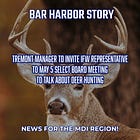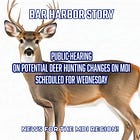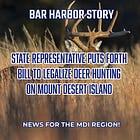Tremont Sells 36-Foot Lobster Boat Jacqueline
Select board talks deer hunt and resident notification system
The Bar Harbor Story is generously sponsored by Window Panes Home and Garden.
TREMONT—After having gone out to bid, a 36-foot Stanley lobster boat once owned by fisherman Richard Higgins now belongs to Harlee Donovan.
Tremont Town Manager Jesse Dunbar told the Tremont Select Board that Higgins had still not communicated with the town about the approximately $2,500 he owed the town for work and labor hours associated with getting the abandoned vessel off its mooring and out of the water.
At the May 19 meeting of the select board, from which members Eric Eaton and Howdy Goodwin had excused absences, Dunbar said that the town had mailed a certified letter to Higgins notifying him that the boat was going out to bid and that he had until May 7 to pay the town to reclaim it.
“Somebody signed for a certified letter that we sent notifying the date of the auction. So that was received, but nobody has seen or heard from him, here (the town office) or at the harbor,” Dunbar told the select board.
At its April 7 meeting, the select board decided to put the vessel, which had been abandoned on its commercial mooring in the harbor, up for bid after hearing from Harbormaster Tyler Damon about the work he had to do to get the boat removed from the water and the communications that he had with Higgins up until that point.
There were three bids received for the boat and they were opened by Dunbar and Town Clerk Sarah Abbott at noon on May 7.
Brian Gordius - $3,366
Philip Donovan - $4,000
Harlee Donovan - $4,100
The select board voted unanimously to sell the boat, which according to Damon, is basically just a useable hull at this point, to Harlee Donovan for $4,100.
2025/26 SELECT BOARD CHAIR AND VICE CHAIR POSITIONS
Only one seat was up for grabs this year on the select board and it was Chair Jamie Thurlow’s.
Thurlow’s term expired this year. With nobody running against him, Thurlow reclaimed his position and with Dunbar calling the meeting to order and running the nomination process, Thurlow was nominated to remain the select board chair.
McKenzie Jewett nominated Thurlow to be chair and member Kevin Buck seconded the nomination. Both Jewett and Buck voted in favor.
Buck nominated Jewett for vice chair with Thurlow seconding the nomination. Thurlow and Buck voted for Jewett to be vice chair and Dunbar turned the meeting over to Thurlow to run as chair.
DEER HUNT PROGRESS
At the select board’s May 5 meeting, members met with Maine Inland Fisheries and Wildlife (IFW) Regional (wildlife) Biologist Steve Dunham and Maine State Representative Mike Lance (R-Paris) via Zoom. This conversation was in response to the introduction of LD 1438 by Maine Representative Billy Bob Faulkingham (R-Winter Harbor) which would have legalized the hunting of deer on Mount Desert Island.
Dunham is the regional wildlife biologist for IFW zone-C, which includes MDI. Representative Lance is on the IFW Legislative (advisory) Committee. They had both been invited to attend the May 5 meeting by Tremont Town Manager Jesse Dunbar.
If the proposed bill was to pass, it would legalize deer hunting at the state level, but the state does not have the right to open up individual municipalities to hunting unless a municipality approves it.
By the end of the May 5 meeting, the board had tasked Dunbar with looking into four possible options for a deer hunt in the town of Tremont.
Expanded archery—This would be part of the state’s regular hunting season and would require the least amount of work/planning on the town’s part. It would not require IFW committee approval unless it was a special hunt outside of the state’s normal deer hunting/expanded archery season.
Resident Only—This would require a plan to be put together by the town and presented to the IFW committee for possible approval.
Limited License Group—This would require a plan to be put together by the town and presented to the IFW committee for possible approval. The limited license group would most likely be some entity that has agreed to be in control of the hunt and be morally and ethically conscious and strictly follow hunting laws and private property access rules.
Hired Hunt—This would be the hiring of a private company or USDA hunters to thin out the deer herd.
Two days after that May 5 select board meeting, on May 7, the IFW Legislative Advisory Committee met and by a unanimous vote for “ought not to pass,” killed the legislation at the committee level. However, as noted above, the Town of Tremont is still investigating possible limited hunting scenarios to try and thin out the deer herd for public safety and nuisance reasons.
During the May 19 meeting, the select board engaged in conversation regarding possible scenarios but ultimately decided to save the more in-depth conversation and possible decision-making for a meeting when all of the board members are present.
One idea that appeared to meet general consensus, although no action was taken, was to eliminate the hired hunt option.
A more popular option, the expanded archery hunt, comes with a major concern. Because the expanded archery season is part of the state’s normal hunting season, if the town was to vote it in as a legal hunting option in the town, there is no easy or efficient manner to end the hunt.
However, the town could present a more advanced version of the expanded archery hunt that provides a “sunset provision” as part of the plan and if that was approved by the IFW Committee, that would allow the town to run the hunt as a trial period.
Thurlow commented that he has spoken with a number of community members who are avid hunters and even they are leery of opening up any sort of hunt in town due to land issues (trespassing and proximity to Acadia National Park) and safety concerns.
There was also discussion regarding a limited license group but that would require an immense amount of planning. The town would need to find a designated group and come up with a very specific plan to present to the IFW Committee. It is a viable option but there are a lot of questions to be answered first.
One of those questions is what would happen to the culled deer. In order to make a difference in the herd, a large number of deer would have to be culled and the select board does not want a wasted deer resource situation in terms of useable food. Who would pay to have the deer butchered? Are there enough volunteers to accomplish that task of processing the harvested deer? Would any food pantries be interested in participating either through volunteerism or by fund donations in exchange for meat that they can give to their customers?
INVESTMENTS OF SURPLUS FUNDS
In the fall of 2023, the select board put $250,000 of surplus funds into a certificate of deposit (CD) with Bar Harbor Financial Services. That CD has matured and earned the town approximately $20,686 in interest which will go into the operating account for the upcoming budget year.
Dunbar asked the select board if they wanted to reinvest the surplus funds back into another CD and gave them two options, a 12-month CD at 4.15% interest or an 18-month CD at 3.95% interest.
The select board unanimously chose to reinvest the $250,000 surplus funds into the 12-month CD at 4.15% interest with Bar Harbor Financial Services.
RESIDENTIAL NOTIFICATION SERVICE
Dunbar presented the select board with signing up for a notification service with TextMyGov that would allow residents to text questions or comments to a number and get a response. That response could be an individual personalized responses or an automated response. The system would also function as a townwide notification system in the event of emergencies, construction, road closures, etc.
“I am just going to say right off the bat, I think you are crazy!” Thurlow said to Dunbar. “Who wants to hear texts from everybody in town in the middle of the night?”
Dunbar clarified that any texts sent in by residents, will go to a computer dashboard, not individual’s phones. The texts can be replied to (if a reply is necessary) or acknowledged either immediately via an automated response or a human generated reply when the time is appropriate.
Residents can ask questions or make the town aware of issues that have occurred or may be occurring and Dunbar feels that it may be a way to make communication between residents and the town easier and more effective.
The cost of the service would be $3,000 per year for the first year and $2,500 per year for subsequent years.
The select board unanimously authorized Dunbar to spend $3,000 to sign up for the service and give it a try.
ANNUAL POLICY RENEWALS AND FEE SCHEDULE
The select board unanimously approved the adoption of the following policies.
General policies and by-laws of the Tremont Select Board
Property tax payment policy
Check disbursement policy
Conduct policy
The select board also unanimously approved the adoption of a proposed fee schedule.
The next meeting of the Tremont Select Board will be June 2, at 5 p.m., in the Harvey Kelley Meeting Room at the town office.
LINKS TO LEARN MORE
Follow us on Facebook. And as a reminder, you can easily view all our past stories and press releases here.
If you’d like to donate to help support us, you can, but no pressure! Just click here (about how you can give) or here (a direct link), which is the same as the button below.
If you’d like to sponsor the Bar Harbor Story, you can! Learn more here.












